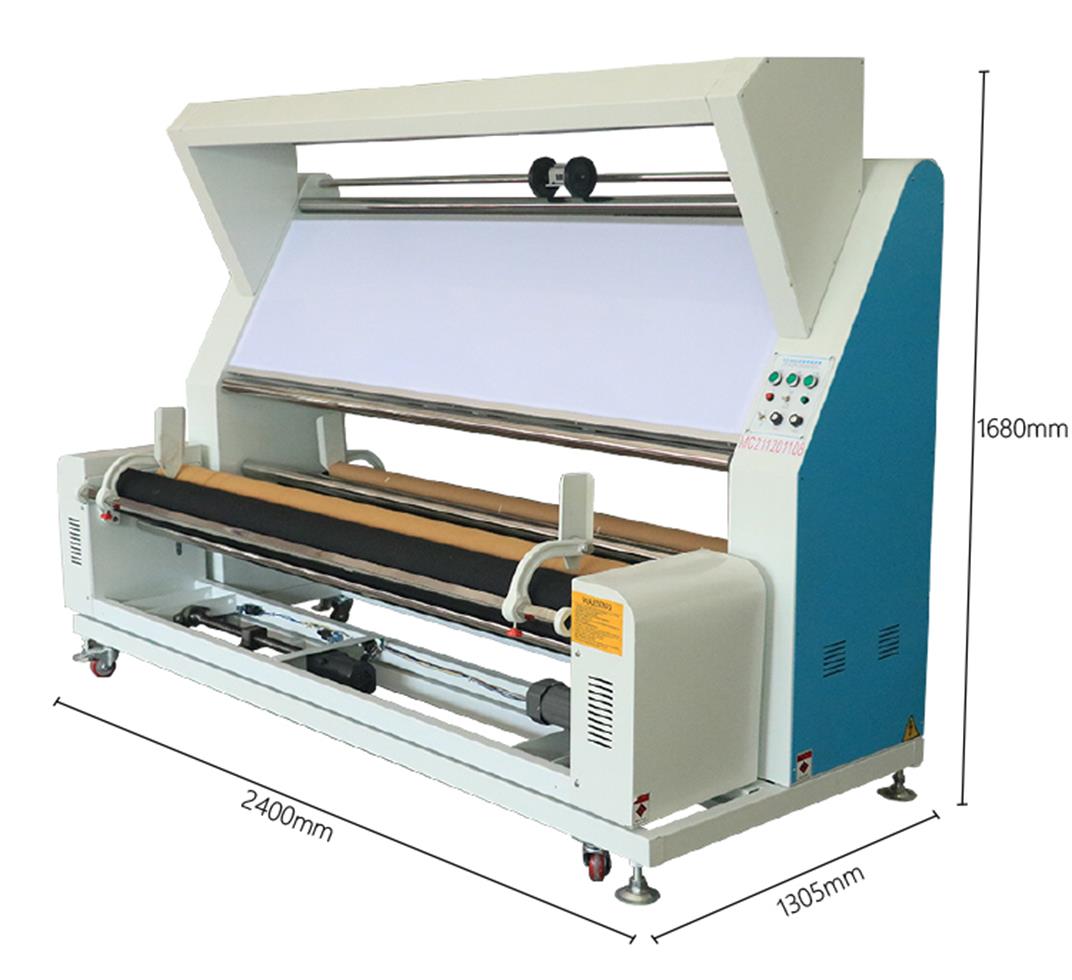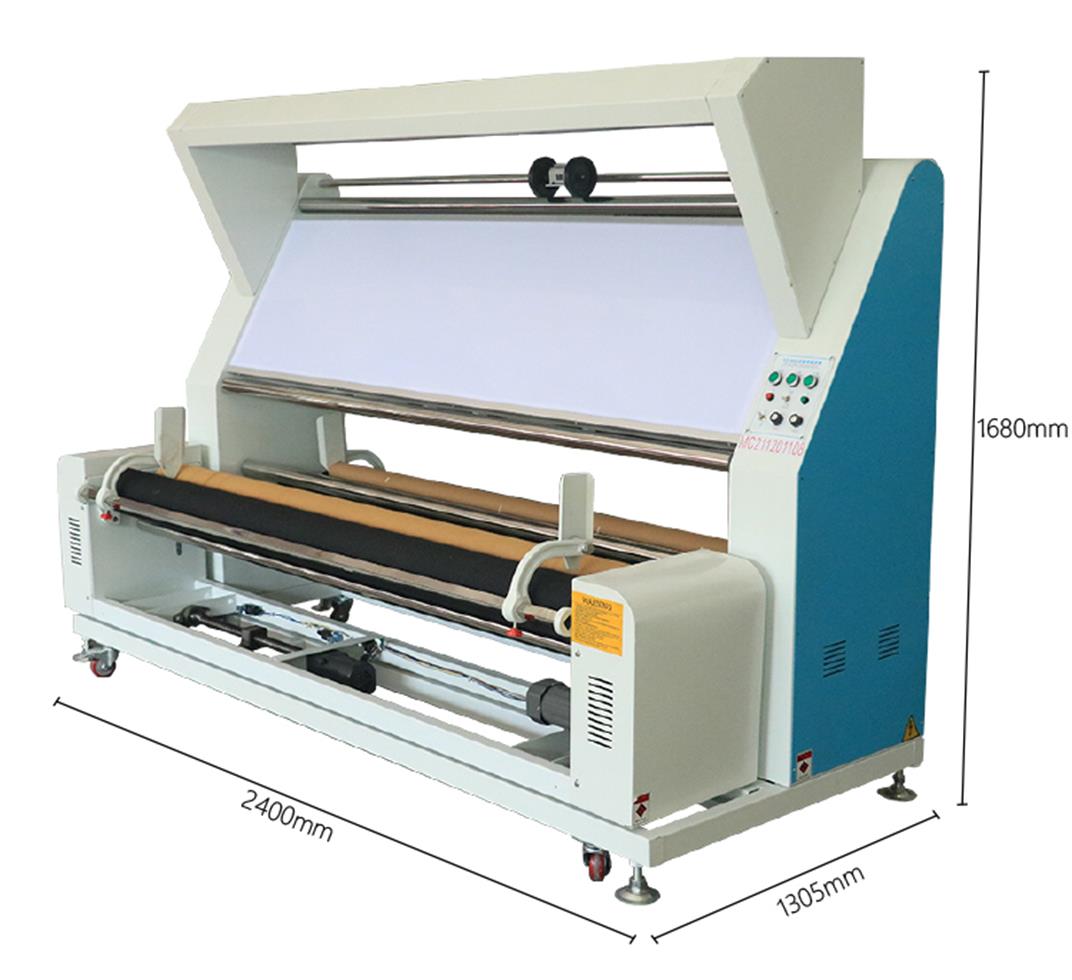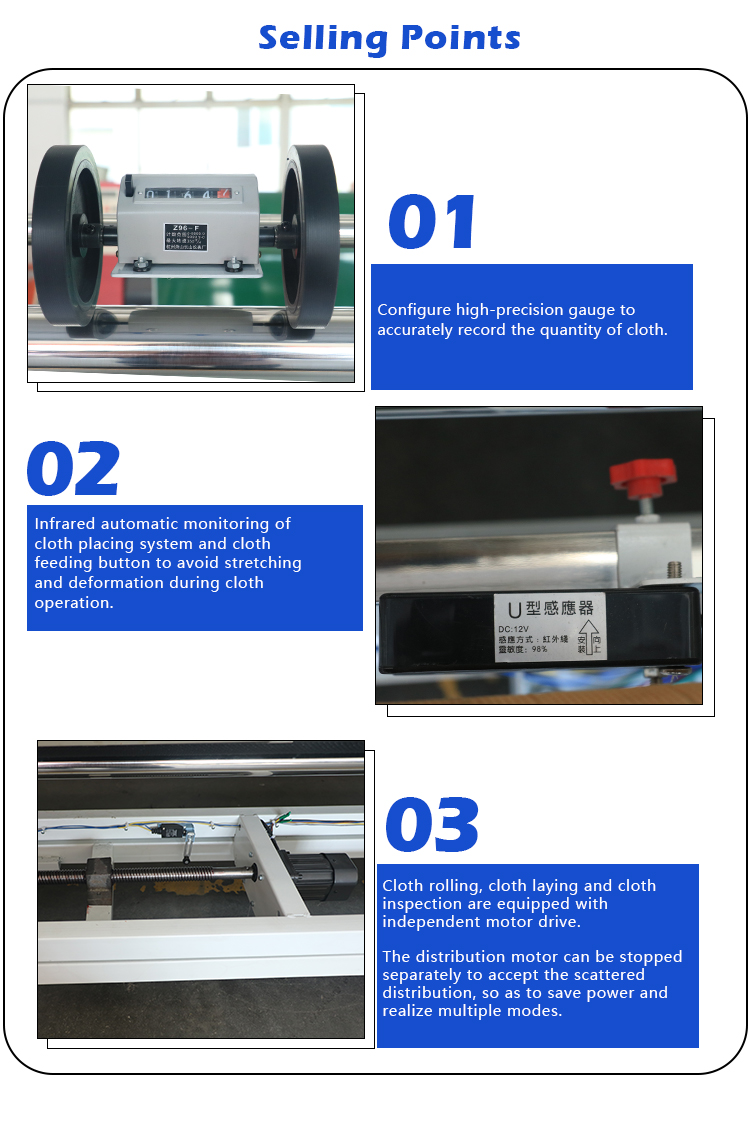
Industrial Fabric Rolling Machine is a device specially designed to roll large rolls of fabric or other materials into smaller rolls or neat rolls for use in industries such as textiles, packaging, automotive and household goods. Industrial Fabric Rolling Machine is mainly used to roll, cut and ensure that the fabric is flat for easy storage and transportation. The use of Industrial Fabric Rolling Machine can significantly improve production efficiency, reduce labor costs, and ensure the quality of the final product.

Product Parameters
| Name | Fabric Rolling Machine |
| working | Speed 0-50m/min |
| power | 750W |
| weight | 250kg |
| input fabric | rolled type |
| output fabric | rolled type |
Industrial Fabric Rolling Machine Features:
1.Infrared automatic monitoring of cloth placing system and cloth feeding button to avoid stretching and deformation during cloth operation.
2.Infrared automatic edge alignment system to ensure that the cloth edges are neat.
3.Cloth rolling, cloth laying and cloth inspection are equipped with independent motor drive. The distribution motor can be stopped separately to accept the scattered distribution, so as to save power and realize multiple modes.
4.Automatic reset and automatic shutdown after cloth inspection.
5.Configure automatic cloth spreading (shifting) roller to make the cloth roll smoother.
6.Fabric Rolling Machine is driven by the frequency converter of famous factory, and the cloth tension or no tension can be adjusted arbitrarily. The cloth inspection speed is adjustable from 0 to 50m / min.
7.The cloth can be rolled back and forth to facilitate the rewinding and re inspection of leakage detection cloth.
8.It is equipped with high-quality transparent materials and strong up and down lights, so that the running cloth can be seen at a glance.
9.Configure high-precision gauge to accurately record the quantity of cloth.
10.The device has the functions of correcting and reversing cloth rolling.
11.Humanized design: it is designed in combination with ergonomics to reduce work fatigue and improve work efficiency.
12.Maximum diameter of unwinding: 35cm.
Selling Points

Application
In the textile industry, the applications and features of industrial fabric winders include:
Applications:
Fabric winding: used to neatly wind various types of fabrics (such as cotton, polyester, silk, etc.) for easy storage and transportation.
Pre-processing: ensure the neatness of fabrics and reduce wrinkles before dyeing and printing.
Quality control: monitor the tension and state of fabrics in real time during winding to ensure product quality.
Multi-layer winding: suitable for winding multiple layers of fabrics to meet the needs of different thicknesses and specifications.
Features:
High efficiency: can wind a large number of fabrics quickly and continuously, significantly improving production efficiency.
Precise control: equipped with advanced control system, it can accurately adjust the winding speed and tension to ensure the flatness of the fabric.
Versatility: some models have multiple functions such as cutting and trimming to meet different processing needs.
Easy operation: humanized design, easy operation and maintenance, reducing the workload of operators.
Durability: made of high-quality materials, can withstand high-intensity working environment and extend service life.
In the packaging industry, industrial fabric rolling machines are used to neatly roll packaging materials such as film, paper and nonwovens for storage and subsequent processing. The Industrial Fabric Rolling Machine can process large amounts of material quickly and continuously, improving production efficiency. It also has the function of combining cutting and winding to provide fixed-length materials to meet specific needs. The advanced control system of the Industrial Fabric Rolling Machine can adjust the winding speed and tension to ensure that the material is neat and undamaged, and many modern winders are highly automated to reduce manual intervention. The Industrial Fabric Rolling Machine is highly adaptable and can handle a variety of packaging materials of different thicknesses and materials. It is made of high-quality materials and has good durability and reliability. These characteristics make the industrial fabric rolling machine play an important role in packaging production.
In industrial applications, Industrial Fabric Rolling Machine is mainly used to roll multi-layer composite materials, industrial fabrics and film materials for storage and transportation. Industrial Fabric Rolling Machine can quickly process large batches of materials, improve production efficiency, and can be integrated with other equipment to form an automated production line. Industrial Fabric Rolling Machine can monitor the winding speed and tension in real time to ensure material integrity. Due to the use of high-quality construction materials, the Industrial Fabric Rolling Machine operates stably in high-intensity working environments, has good durability and simple operation design, which makes it a key equipment in various production processes.
FAQ
Uneven winding material, how to solve it?
Check whether the winding tension is set correctly and make sure the material remains flat during the winding process.
The material is wrinkled during the winding process, what is the reason?
It may be that the material is not properly tensioned or the winding speed is too fast. Adjusting the tension and speed can solve this problem.
The winding machine is too noisy, is it normal?
Moderate noise is normal, but if the noise is abnormal, it may be that the mechanical parts are worn or need lubrication. It is recommended to check.
How to clean the winding machine?
Use a clean cloth and an appropriate detergent to gently wipe the surface of the machine, and check and clean the material residue regularly.
How to adjust the winding diameter of the winding machine?
Depending on the machine model, the winding diameter can usually be changed by adjusting the reel or setting parameters. Please refer to the user manual for specific methods.
How to set the winding speed?
The winding speed can usually be adjusted on the control panel. It is recommended to select the appropriate speed according to the material characteristics.
The material breaks during the winding process. What should I do?
Stop the machine immediately, check whether the material has defects, adjust the tension setting, and ensure that the material is suitable for winding.
How to ensure the winding quality?
Regular equipment maintenance is performed to check machine components, ensure material quality, and adjust operating parameters according to material characteristics.
Does the winding machine require regular maintenance?
Yes, regular maintenance is necessary, including checking lubrication, cleaning the machine, and tightening loose parts to ensure the normal operation of the equipment and extend its service life.